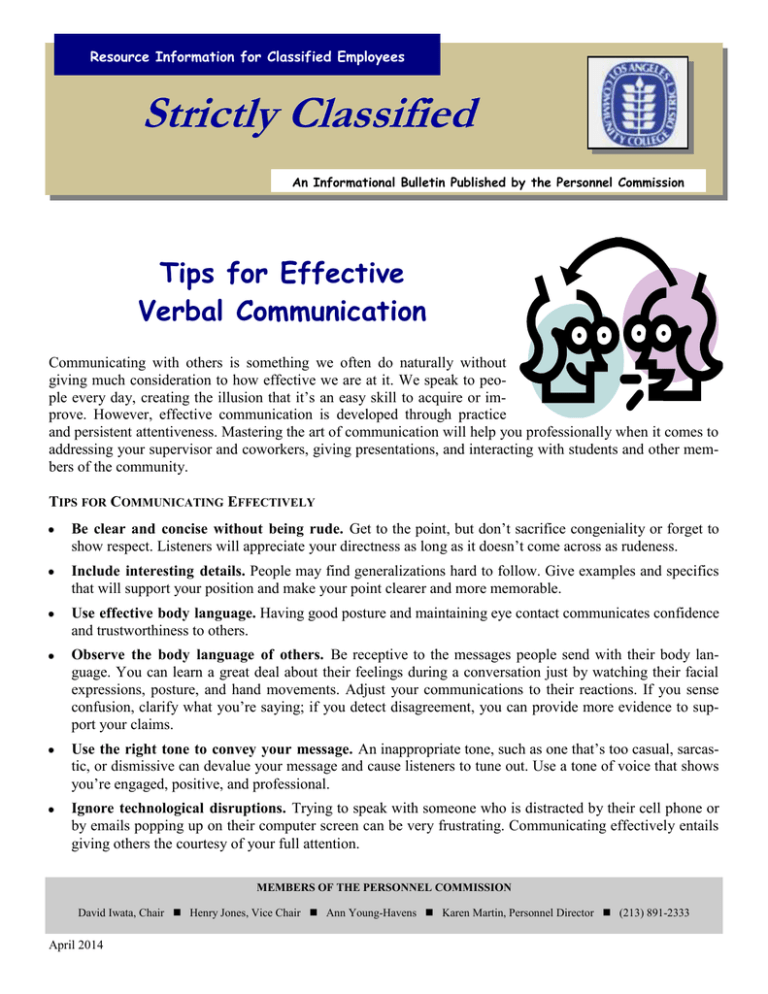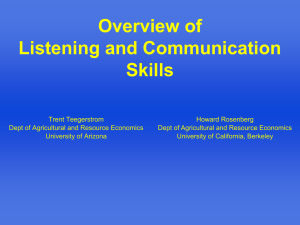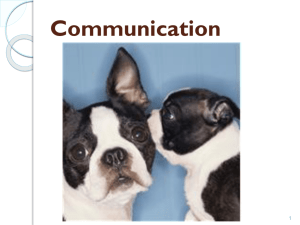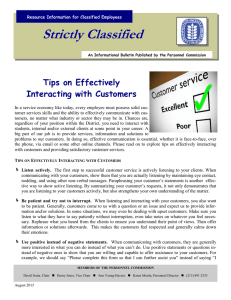Strictly Classified Tips for Effective Verbal Communication
advertisement

Resource Information for Classified Employees Strictly Classified An Informational Bulletin Published by the Personnel Commission Tips for Effective Verbal Communication Communicating with others is something we often do naturally without giving much consideration to how effective we are at it. We speak to people every day, creating the illusion that it’s an easy skill to acquire or improve. However, effective communication is developed through practice and persistent attentiveness. Mastering the art of communication will help you professionally when it comes to addressing your supervisor and coworkers, giving presentations, and interacting with students and other members of the community. TIPS FOR COMMUNICATING EFFECTIVELY Be clear and concise without being rude. Get to the point, but don’t sacrifice congeniality or forget to show respect. Listeners will appreciate your directness as long as it doesn’t come across as rudeness. Include interesting details. People may find generalizations hard to follow. Give examples and specifics that will support your position and make your point clearer and more memorable. Use effective body language. Having good posture and maintaining eye contact communicates confidence and trustworthiness to others. Observe the body language of others. Be receptive to the messages people send with their body language. You can learn a great deal about their feelings during a conversation just by watching their facial expressions, posture, and hand movements. Adjust your communications to their reactions. If you sense confusion, clarify what you’re saying; if you detect disagreement, you can provide more evidence to support your claims. Use the right tone to convey your message. An inappropriate tone, such as one that’s too casual, sarcastic, or dismissive can devalue your message and cause listeners to tune out. Use a tone of voice that shows you’re engaged, positive, and professional. Ignore technological disruptions. Trying to speak with someone who is distracted by their cell phone or by emails popping up on their computer screen can be very frustrating. Communicating effectively entails giving others the courtesy of your full attention. MEMBERS OF THE PERSONNEL COMMISSION David Iwata, Chair Henry Jones, Vice Chair Ann Young-Havens Karen Martin, Personnel Director (213) 891-2333 April 2014 Be constructive when responding to others. There’s no need to be overly critical when giving feedback. Take a moment before reacting to make sure your response isn’t emotionally charged. Keep a good pace and don’t mumble. Talking too fast or too slow can cause you to lose your audience. Likewise, mumbling your words will quickly lose everyone’s attention. Not only will people not be able to understand you, mumbling also indicates a lack of confidence, signaling to your listener that what you’re saying isn’t that important. Avoid knee-jerk reactions. Hear someone out before immediately and concretely shooting down what they are saying. It’s more diplomatic to first express your difference of opinion in the form of a question instead of instantly disagreeing. Phrasing your concerns in the form of a question presents you with the opportunity to get clarification on the matter. You may learn more information that will lead you to better understand the other person’s perspective. A CLOSER LOOK AT COMMUNICATION: IMPROVING YOUR LISTENING SKILLS Communication is a two-way street. You want to make sure you’re communicating with people, not at them. Most of us focus on verbalizing our thoughts rather than the other side of the conversation coin: listening. Often when we’re supposed to be listening to others, we’re actually silently preparing our response, thinking about our to-do list, or making mental plans for that evening. Sometimes we tune someone out or, even worse, interrupt because we assume that we know what they are trying to say. It’s nearly impossible to effectively communicate with someone without giving them our full attention and allowing them to finish speaking. So how do we improve our listening skills? Like most skills, refining your ability to listen takes practice. When listening to others, create a list in your mind of all their major points. After the conversation, challenge yourself to recall three main things they said. Treat it like a quiz game to add an element of fun, and after a while retaining major points will become habit. Another way to develop your listening skills is to rephrase what the other person says after they are finished talking. This practice lets the other person know that you’ve paid attention to them and also provides them with the opportunity to correct or clarify any misunderstandings. With a little practice, you’ll find your verbal communications to be much more productive and rewarding. It will be easier to focus on the other person’s message, and you’ll also have fewer misunderstandings. Being a good listener and an effective communicator will also earn the respect and trust of your supervisor, colleagues, and members of the community. We’d like to hear from you! Please visit the following survey link to provide us with valuable feedback on our bulletins: https://www.surveymonkey.com/s/6VMWPV8.






